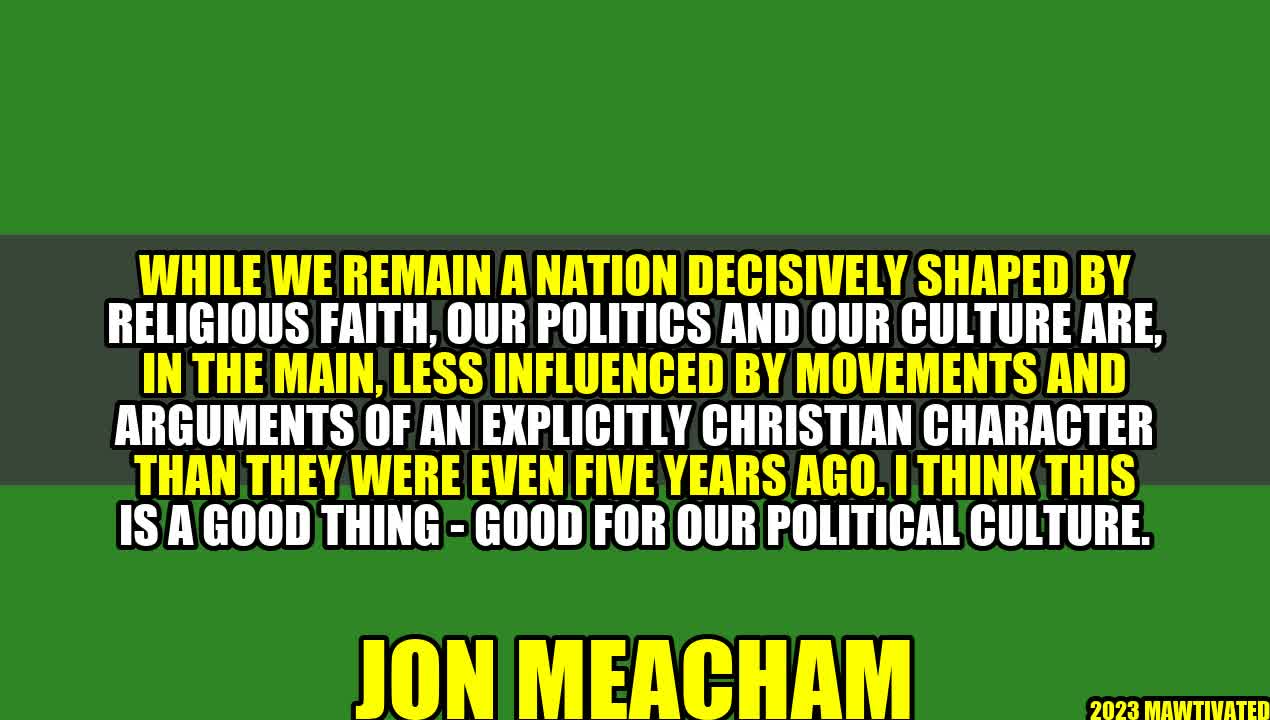The Decline of Explicitly Christian Influences in Politics and Culture

As a society, we are constantly changing and evolving. One of the most notable changes in recent years has been the decline of explicitly Christian influences in politics and culture. While some may see this as a negative development, I believe that it is ultimately a positive thing for our society.
An Inspiring Story:
One of the most inspiring stories that illustrates this change is the career of Jon Meacham. Meacham is a Pulitzer Prize-winning author and historian who has written extensively about American politics and culture. While Meacham is a devout Christian, he has never allowed his faith to dictate his political beliefs or cloud his judgment as a historian. Meacham’s work exemplifies the idea that one can be deeply religious and still be objective and fair-minded in their analysis of society and politics.
and Case Studies:
There are countless examples of individuals who have been able to separate their religious beliefs from their political beliefs and cultural interests. One such example is a friend of mine who is a devout Christian but also a staunch supporter of LGBTQ rights. While her faith teaches that homosexuality is a sin, she believes that it is not her place to judge others and that all people should have equal rights and opportunities regardless of their sexual orientation. Another example is the rise of secularism in Western Europe, where religion plays a much smaller role in public affairs than it does in the United States. Despite this, these countries have thriving democracies and vibrant cultures that are not hampered by the lack of religious influence.
Why I Believe This Is a Good Thing:
I believe that the decline of explicitly Christian influences in politics and culture is a good thing for several reasons:
- Diversity: As society becomes more diverse, it is important that our political and cultural institutions reflect this diversity. Emphasizing any one religious tradition over others is not only unfair but also counterproductive to fostering a harmonious and inclusive society.
- Critical Thinking: By separating our religious beliefs from our political beliefs and cultural interests, we are forced to think critically and objectively about the issues at hand. This encourages healthy debate and discussion and helps us arrive at better solutions to the problems facing society.
- Progress: The decline of religious influence in politics and culture has allowed for progress on issues that were previously stagnated by religious dogma. For example, LGBTQ rights and marriage equality would not have made the strides they have in recent years if not for the decline of religious influence in public affairs.
Conclusion:
In conclusion, while we remain a nation shaped by religious faith, it is ultimately a positive thing that our politics and culture are less influenced by explicitly Christian movements and arguments than they were in the past. This allows for greater diversity, critical thinking, and progress in our society.
hashtags:
#DeclineOfChristianInfluence #Diversity #CriticalThinking #Progress #ReligionAndPolitics #ReligionAndCulture
SEO Keywords:
Christian influence, politics, culture, diversity, critical thinking, progress, religion, LGBTQ rights, marriage equality, society
Article Category:
Religion and Society/Politics/Culture

Curated by Team Akash.Mittal.Blog
Share on Twitter
Share on LinkedIn